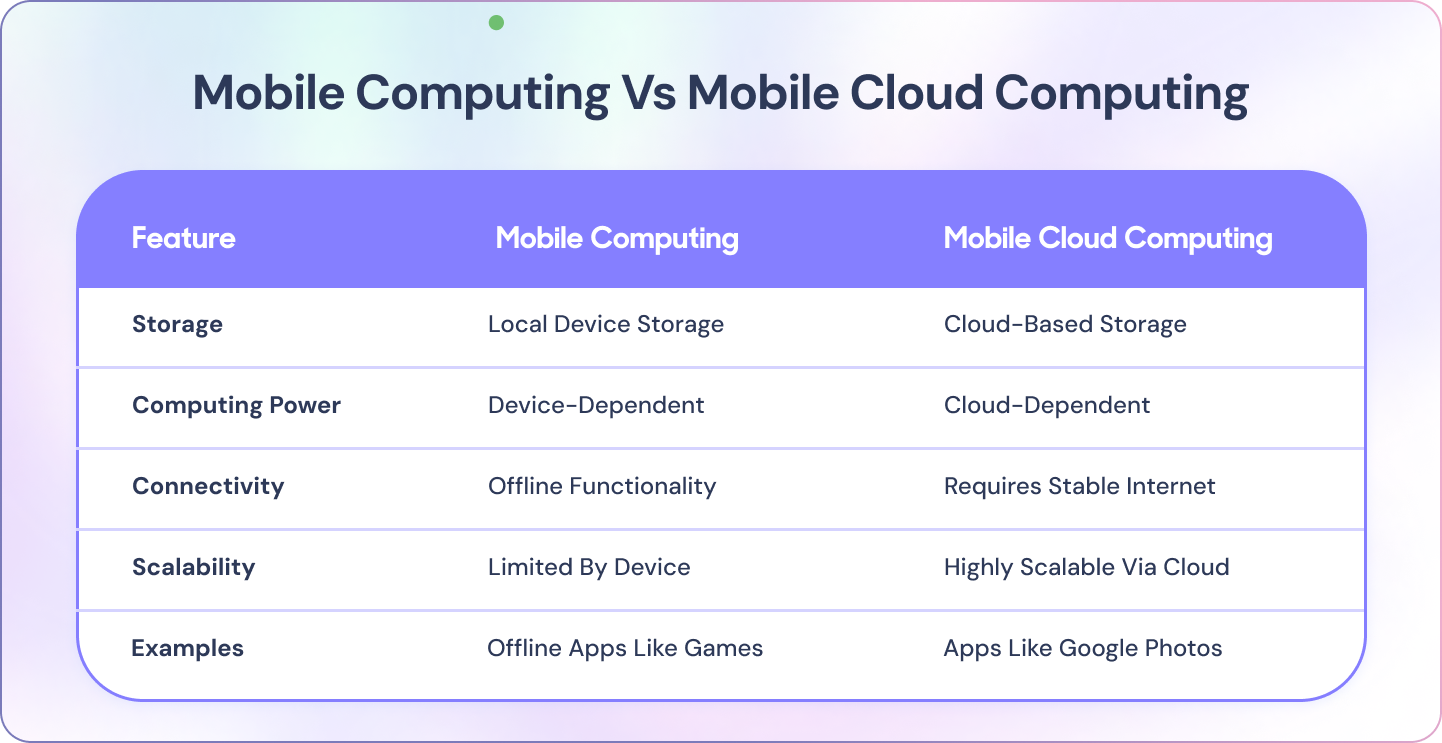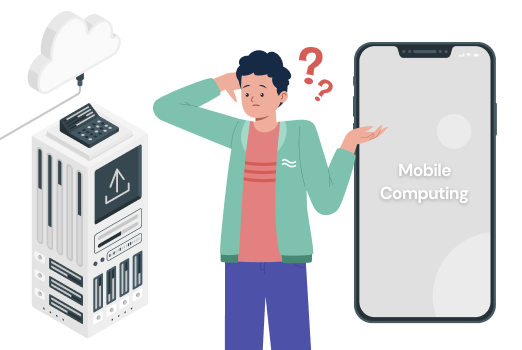Cloud or Mobile Computing: Which Technology Suits Your Needs?
In the fast-paced digital world of nowadays, every organization is seeking innovative solutions for operations, and two of the most significant technological advancements within the last few years-that are mobile cloud computing and mobile computing-have modified completely the way people develop, deploy, and use applications. But how to know which technology to select?
This article goes into the core differences, benefits, and applications of these technologies, thus enabling the reader to take an informed decision.
Understanding Mobile Cloud Computing
Mobile cloud computing is a paradigm that merges cloud computing with mobile devices. It allows applications to utilize the resources of the cloud in terms of storage, processing, and software services to overcome the limitation of mobile devices in terms of computational capability and storage.
For instance, applications such as Google Drive or Microsoft Office 365 use mobile cloud computing to store data and execute operations on the cloud while offering seamless access across devices. Businesses that rely on mobile application development services increasingly turn to cloud solutions to enhance scalability and performance.
What is Mobile Computing?
Mobile computing focuses on the ability of mobile devices such as smartphones and laptops to allow users to access data and applications from any location. It’s all about mobility, away from the previous idea of be-tethered computers. Unlike mobile cloud computing, which depends more on external cloud servers, mobile computing leverages device-local resources.
Examples include standalone mobile apps such as gaming applications that operate fully on the device and don’t require constant internet connectivity.
Key Differences Between Mobile and Mobile Cloud Computing

Why Choose Mobile Cloud Computing?
The benefits of mobile cloud computing for businesses include:
Greater Scalability: With cloud solutions, you’re able to scale up or down depending on demand, which is ideal for dynamic workloads.
Cost Efficiency: You save the cost of the hardware by outsourced computing to the cloud.
Remote Accessibility: With data saved in the cloud, users are able to reach applications and files at any time anywhere.
Seamless Upgrades: Updates and maintenance in cloud-based applications are easier with less downtime
For instance, an android application development company will depend on the cloud services that test and deploy applications efficiently. This will allow for smooth experience for the end-users.
Power of Mobile Computing
Despite developments in cloud technology, mobile computing continues to occupy its share of specific scenarios:
Access when the user is off-line: Applications that must perform off-line must be developed using mobile computing; these may include off-line games or off-line utility tools.
Institution of Privacy and Security: Storage of sensitive information locally limits your exposure to accessing data breaches common with cloud storage facilities.
Lower dependency on connection: Mobile computing is best used where internet connectivity is unreliable.
However, developing mobile computing applications requires robust expertise in mobile application development services to ensure apps run efficiently on a wide range of devices.
Emerging Trends in Mobile Cloud Computing
As businesses and consumers embrace mobile cloud solutions, several trends are shaping the future of mobile cloud computing:
Integration with Artificial Intelligence (AI): Cloud computing enables AI-driven mobile apps by providing powerful cloud-based processing capabilities.
Edge Computing: The confluence of cloud and edge computing reduces latency due to proximity between the location where the data will be processed and the end-user location.
Cross-Platform Compatibility: With cloud apps, there’s more and more design that crosses multiple platforms to run.
Want to read more about mobile cloud computing future? Here’s the in-depth blog post.
Decision Tree: Cloud or Mobile Computing?
Flowchart: Showing a choice tree on when to go for either cloud or mobile computing. Sample
Do you need to be available offline?
➤ Yes: Mobile Computing
➤ No: Go to Step 2
Do you need to have high scalability and remote access?
➤ Yes: Mobile Cloud Computing
➤ No: Mobile Computing
Factors to Consider Before Choosing
Before choosing between mobile cloud computing and mobile computing, consider the following factors:
Nature of the Application: Cloud computing is best suited for collaborative and resource-intensive apps, while mobile computing is best suited for standalone apps.
User Base: If users require offline access, then opt for mobile computing. For broader accessibility, go for cloud.
Budget Constraints: Cloud computing involves subscription costs, whereas mobile computing relies on upfront hardware investments.
Development Expertise: Collaborate with an experienced android app development company that understands your specific requirements and can guide you toward the right choice.
Future of Mobile Cloud Computing in App Development
The adoption of mobile cloud computing is on the rise, especially among businesses looking for innovative mobile application development services. From healthcare apps to e-commerce platforms, the role of the cloud in app development is undeniable.
Emerging frameworks and tools, such as Firebase and AWS Mobile Hub, empower developers to create sophisticated cloud-based applications. Moreover, integrating advanced technologies like AI and Machine Learning into cloud apps has become more accessible than ever.
Conclusion
Modern application development heavily relies on both mobile and mobile cloud computing. Nowadays, selecting the correct kind of technology depends on the functionality of the application, their requirement for the users, and the requirement for scalability. For businesses, collaborating with a seasoned android app development company ensures efficient development tailored to your goals.
Whether you’re focusing on cloud solutions for their flexibility or mobile computing for offline functionality, the right choice can significantly impact your business’s digital journey. Explore more about mobile cloud solutions and their future in app development here.
TABLE OF CONTENT
- Cloud or Mobile Computing: Which Technology Suits Your Needs?
- Understanding Mobile Cloud Computing
- What is Mobile Computing?
- Key Differences Between Mobile and Mobile Cloud Computing
- Why Choose Mobile Cloud Computing?
- Emerging Trends in Mobile Cloud Computing
- Want to read more about mobile cloud computing future? Here’s the in-depth blog post.
- Factors to Consider Before Choosing
- Future of Mobile Cloud Computing in App Development
- Conclusion
